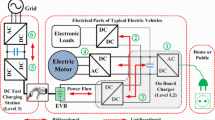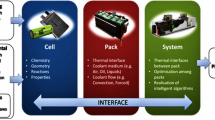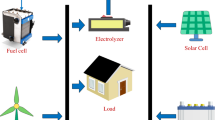Abstract
In recent times, transportation electrification has been recognized as one of the key solutions to accelerate global GHG emission reductions. As the electric vehicle industry grows faster, plug-in electric vehicles (PEV) are expected to be the most dominant load in the utility sector in less than a decade. Regular charging of the battery energy storage system (BESS) is a mandate for the continued operation of the vehicle, and the PEVs are connected to the utility to charge. Since PEVs are mobility loads, predicting the interconnection of these mobility loads in the utility network for recharging is a major challenge. The intermittent connection of mobility loads to the grid for charging leads to an unpredictable increase in electricity demand and other grid-related issues. Optimal scheduling of PEV charging would conquer the grid-related issues and provide financial benefits to the users. In this paper, an intelligent charge scheduling technique of PEV charging for both residential and commercial charging stations using the heuristic algorithm is proposed and discussed. The primary objective of the algorithm is to achieve the minimization of PEV charging costs by implementing an interrupted charging schedule. The proposed algorithm is tested by conducting exhaustive simulation studies under several conditions for PEVs with different power ratings for residential and commercial charging scenarios. The time-of-use pricing (ToUP) system is adopted as a tariff system in this paper. A detailed comparison of the unscheduled algorithm, the modified placement algorithm (MPA) and proposed heuristic technique-based charge scheduling is carried out through simulation studies. A detailed cost analysis for charging the PEVs with the selected charge scheduling techniques for various conditions is conducted and cost minimization by implementing the proposed charging scheme is validated.











Similar content being viewed by others
Abbreviations
- BESS:
-
Battery energy storage system
- CPP:
-
Critical peak pricing
- EGR:
-
Emission gap report
- EV:
-
Electric vehicle
- GA:
-
Genetic algorithm
- GHGEs:
-
Greenhouse gas emission
- G2V:
-
Grid to vehicle
- IBR:
-
Inclined block rate
- LRM:
-
Lagrange relaxation method
- MDP:
-
Markov decision process
- MFG:
-
Mean-field game
- MPA:
-
Modified placement algorithm
- PEV:
-
Plug-in electric vehicles
- PSO:
-
Particle swarm optimization
- RTP:
-
Real-time pricing
- ToUP:
-
Time-of-use pricing
- V2G:
-
Vehicle-to-grid
- \(A_{t}\) :
-
Vehicle entry time
- \(D_{t}\) :
-
Exit time of the vehicle
- \({\text{EC}}_{n} (S_{n} )\) :
-
Estimated cost of charging of the nth vehicle
- \(L\) :
-
Charge duration
- \(P_{{{\text{EVn}}}}\) :
-
Power rating of the BESS of the vehicle in kW
- \(S_{n}\) :
-
Starting time of charging
- \(S_{{{\text{gn}}}}\) :
-
Slot with minimum cost
- T :
-
Utility tariff
References
Mohamed N, Aymen F, Ali ZM et al (2021) Efficient power management strategy of electric vehicles based hybrid renewable energy. Sustainability 13:7351. https://doi.org/10.3390/su13137351
Wu Y, Zhang L (2017) Can the development of electric vehicles reduce the emission of air pollutants and greenhouse gases in developing countries? Transp Res D Transp Environ 51:129–145. https://doi.org/10.1016/j.trd.2016.12.007
Li Y, Han M, Yang Z, Li G (2021) Coordinating flexible demand response and renewable uncertainties for scheduling of community integrated energy systems with an electric vehicle charging station: a bi-level approach. IEEE Trans Sustain Energy. https://doi.org/10.1109/tste.2021.3090463
Hagman J, Langbroek JHM (2019) Conditions for electric vehicle taxi: a case study in the greater Stockholm region. Int J Sustain Transp 13:450–459. https://doi.org/10.1080/15568318.2018.1481547
Zhou Y, Wang M, Hao H et al (2015) Plug-in electric vehicle market penetration and incentives: a global review. Mitig Adapt Strateg Glob Chang 20:777–795. https://doi.org/10.1007/s11027-014-9611-2
Savari GF, Krishnasamy V, Sathik J et al (2020) Internet of Things based real-time electric vehicle load forecasting and charging station recommendation. ISA Trans 97:431–447. https://doi.org/10.1016/j.isatra.2019.08.011
Ahmadian A, Mohammadi-Ivatloo B, Elkamel A (2020) A review on plug-in electric vehicles: introduction, current status, and load modeling techniques. J Mod Power Syst Clean Energy 8:412–425. https://doi.org/10.35833/MPCE.2018.000802
Zheng Y, Niu S, Shang Y et al (2019) Integrating plug-in electric vehicles into power grids: a comprehensive review on power interaction mode, scheduling methodology and mathematical foundation. Renew Sustain Energy Rev 112:424–439. https://doi.org/10.1016/j.rser.2019.05.059
Ma Z, Zou S, Liu X (2015) A distributed charging coordination for large-scale plug-in electric vehicles considering battery degradation cost. IEEE Trans Control Syst Technol 23:2044–2052. https://doi.org/10.1109/TCST.2015.2394319
Vahedipour-Dahraie M, Rashidizaheh-Kermani H, Najafi H et al (2017) Coordination of EVs participation for load frequency control in isolated microgrids. Appl Sci 7:539. https://doi.org/10.3390/app7060539
Hu J, Morais H, Sousa T, Lind M (2016) Electric vehicle fleet management in smart grids: A review of services, optimization and control aspects. Renew Sustain Energy Rev 56:1207–1226. https://doi.org/10.1016/j.rser.2015.12.014
Yang H, Chung S, Zhao J (2013) Application of plug-in electric vehicles to frequency regulation based on distributed signal acquisition via limited communication. IEEE Trans Power Syst 28:1017–1026. https://doi.org/10.1109/TPWRS.2012.2209902
Lin J, Leung K-C, Li VOK (2014) Optimal scheduling with vehicle-to-grid regulation service. IEEE Internet Things J 1:556–569. https://doi.org/10.1109/JIOT.2014.2361911
Liu H, Hu Z, Song Y et al (2015) Vehicle-to-grid control for supplementary frequency regulation considering charging demands. IEEE Trans Power Syst 30:3110–3119. https://doi.org/10.1109/TPWRS.2014.2382979
Peng C, Zou J, Lian L, Li L (2017) An optimal dispatching strategy for V2G aggregator participating in supplementary frequency regulation considering EV driving demand and aggregator’s benefits. Appl Energy 190:591–599. https://doi.org/10.1016/j.apenergy.2016.12.065
Fachrizal R, Munkhammar J (2020) Improved photovoltaic self-consumption in residential buildings with distributed and centralized smart charging of electric vehicles. Energies 13:1153. https://doi.org/10.3390/en13051153
Lam AYS, Leung K-C, Li VOK (2016) Capacity estimation for vehicle-to-grid frequency regulation services with smart charging mechanism. IEEE Trans Smart Grid 7:156–166. https://doi.org/10.1109/TSG.2015.2436901
Karfopoulos EL, Panourgias KA, Hatziargyriou ND (2016) Distributed coordination of electric vehicles providing V2G regulation services. IEEE Trans Power Syst 31:2834–2846. https://doi.org/10.1109/TPWRS.2015.2472957
Yi Z, Scoffield D, Smart J et al (2020) A highly efficient control framework for centralized residential charging coordination of large electric vehicle populations. Int J Electr Power Energy Syst 117:105661. https://doi.org/10.1016/j.ijepes.2019.105661
Wang M, Mu Y, Shi Q et al (2020) Electric vehicle aggregator modeling and control for frequency regulation considering progressive state recovery. IEEE Trans Smart Grid. https://doi.org/10.1109/TSG.2020.2981843
Jalilzadeh Hamidi R, Livani H (2017) Myopic real-time decentralized charging management of plug-in hybrid electric vehicles. Electr Power Syst Res 143:522–532. https://doi.org/10.1016/j.epsr.2016.11.002
Kikhavani MR, Hajizadeh A, Shahirinia A (2020) Charging coordination and load balancing of plug-in electric vehicles in unbalanced low-voltage distribution systems. IET Gener Transm Distrib 14:389–399. https://doi.org/10.1049/iet-gtd.2019.0397
Qi W, Xu Z, Shen Z-JM et al (2014) Hierarchical coordinated control of plug-in electric vehicles charging in multifamily dwellings. IEEE Trans Smart Grid 5:1465–1474. https://doi.org/10.1109/TSG.2014.2308217
Ramos Muñoz E, Jabbari F (2020) A decentralized, non-iterative smart protocol for workplace charging of battery electric vehicles. Appl Energy 272:115187. https://doi.org/10.1016/j.apenergy.2020.115187
Tajeddini MA, Kebriaei H (2019) A mean-field game method for decentralized charging coordination of a large population of plug-in electric vehicles. IEEE Syst J 13:854–863. https://doi.org/10.1109/JSYST.2018.2855971
Cardona JE, López JC, Rider MJ (2018) Decentralized electric vehicles charging coordination using only local voltage magnitude measurements. Electr Power Syst Res 161:139–151. https://doi.org/10.1016/j.epsr.2018.04.003
Cheng S, Feng Y, Wang X (2019) Application of lagrange relaxation to decentralized optimization of dispatching a charging station for electric vehicles. Electronics 8:288. https://doi.org/10.3390/electronics8030288
Zhou K, Cheng L, Wen L et al (2020) A coordinated charging scheduling method for electric vehicles considering different charging demands. Energy 213:118882. https://doi.org/10.1016/j.energy.2020.118882
Jian L, Zheng Y, Shao Z (2017) High efficient valley-filling strategy for centralized coordinated charging of large-scale electric vehicles. Appl Energy 186:46–55. https://doi.org/10.1016/j.apenergy.2016.10.117
Zhan K, Hu Z, Song Y et al (2015) A probability transition matrix based decentralized electric vehicle charging method for load valley filling. Electr Power Syst Res 125:1–7. https://doi.org/10.1016/j.epsr.2015.03.013
Ki Y, Kim B-I, Ko YM et al (2018) Charging scheduling problem of an M-to-N electric vehicle charger. Appl Math Model 64:603–614. https://doi.org/10.1016/j.apm.2018.07.060
Wu Y, Zhang Y, Li G et al (2020) A predictive energy management strategy for multi-mode plug-in hybrid electric vehicles based on multi neural networks. Energy 208:118366. https://doi.org/10.1016/j.energy.2020.118366
Papadopoulos P, Jenkins N, Cipcigan LM et al (2013) Coordination of the charging of electric vehicles using a multi-agent system. IEEE Trans Smart Grid 4:1802–1809. https://doi.org/10.1109/TSG.2013.2274391
Xydas E, Marmaras C, Cipcigan LM (2016) A multi-agent based scheduling algorithm for adaptive electric vehicles charging. Appl Energy 177:354–365. https://doi.org/10.1016/j.apenergy.2016.05.034
Janjic A, Velimirovic L, Stankovic M, Petrusic A (2017) Commercial electric vehicle fleet scheduling for secondary frequency control. Elect Power Syst Res 147:31–41. https://doi.org/10.1016/j.epsr.2017.02.019
Yang J, He L, Fu S (2014) An improved PSO-based charging strategy of electric vehicles in electrical distribution grid. Appl Energy 128:82–92. https://doi.org/10.1016/j.apenergy.2014.04.047
Iversen EB, Morales JM, Madsen H (2013) Optimal charging of an electric vehicle using a Markov decision process. Appl Energy 123:1–12. https://doi.org/10.1016/j.apenergy.2014.02.003
Mukherjee JC, Gupta A (2015) A review of charge scheduling of electric vehicles in smart grid. IEEE Syst J 9:1541–1553. https://doi.org/10.1109/JSYST.2014.2356559
Amin A, Tareen WUK, Usman M et al (2020) A review of optimal charging strategy for electric vehicles under dynamic pricing schemes in the distribution charging network. Sustain 12:1–28. https://doi.org/10.3390/su122310160
García Álvarez J, González M, Rodríguez Vela C, Varela R (2018) Electric vehicle charging scheduling by an enhanced artificial bee colony algorithm. Energies 11:2752. https://doi.org/10.3390/en11102752
Suyono H, Rahman MT, Mokhlis H et al (2019) Optimal scheduling of plug-in electric vehicle charging including time-of-use tariff to minimize cost and system stress. Energies 12:1500. https://doi.org/10.3390/en12081500
Al-Gabalawy M, Hosny NS, Dawson JA, Omar AI (2021) State of charge estimation of a Li-ion battery based on extended Kalman filtering and sensor bias. Int J Energy Res 45:6708–6726. https://doi.org/10.1002/er.6265
Arif AI, Babar M, Ahamed TPI et al (2016) Online scheduling of plug-in vehicles in dynamic pricing schemes. Sustain Energy Grids Netw 7:25–36. https://doi.org/10.1016/j.segan.2016.05.001
Javaid N, Ahmed A, Iqbal S, Ashraf M (2018) Day ahead real time pricing and critical peak pricing based power scheduling for smart homes with different duty cycles. Energies 11:1464. https://doi.org/10.3390/en11061464
Sheik MS, Imthias ATP, Devaraj D (2019) Optimized charge scheduling of plug-in electric vehicles using modified placement algorithm. In: Proceedings of the 2019 international conference on computer communication and informatics (ICCCI). IEEE, pp 1–5
Alonso M, Amaris H, Germain J, Galan J (2014) Optimal charging scheduling of electric vehicles in smart grids by heuristic algorithms. Energies 7:2449–2475. https://doi.org/10.3390/en7042449
Wei X, Su S, Yue Y et al (2017) Electric vehicles charging scheduling strategy considering the uncertainty of photovoltaic output. IOP Conf Ser Mater Sci Eng 199:012006. https://doi.org/10.1088/1757-899X/199/1/012006
Author information
Authors and Affiliations
Corresponding author
Additional information
Publisher's Note
Springer Nature remains neutral with regard to jurisdictional claims in published maps and institutional affiliations.
Rights and permissions
About this article
Cite this article
Mohammed, S.S., Ahamed, T.P.I., Aleem, S.H.E.A. et al. Interruptible charge scheduling of plug-in electric vehicle to minimize charging cost using heuristic algorithm. Electr Eng 104, 1425–1440 (2022). https://doi.org/10.1007/s00202-021-01398-z
Received:
Accepted:
Published:
Issue Date:
DOI: https://doi.org/10.1007/s00202-021-01398-z




